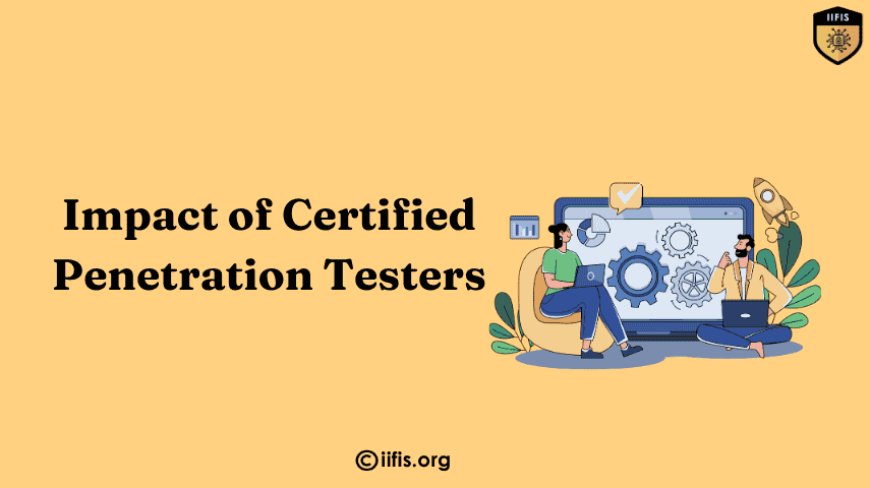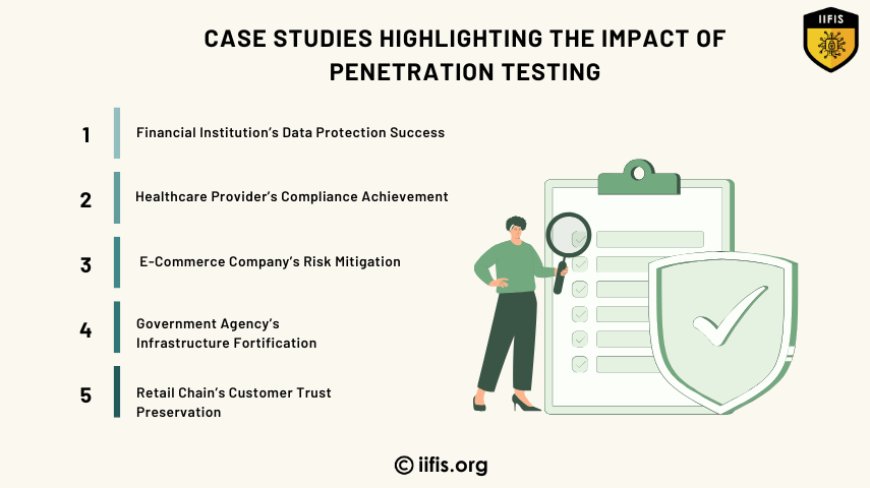Impact of Certified Penetration Testers
Certified penetration testers play a crucial role in strengthening cybersecurity by identifying vulnerabilities and preventing data breaches. Learn how their expertise impacts organizational security and compliance.

Cyber threats are becoming increasingly advanced, organizations must prioritize their cybersecurity measures to protect sensitive data and maintain trust. Certified penetration testers play a crucial role in this world by simulating cyberattacks to identify weaknesses within systems and networks. Their expertise not only helps organizations strengthen their security posture but also ensures respect with industry regulations. By proactively identifying and addressing potential weaknesses, certified penetration testers contribute to reducing the risk of data breaches and minimizing the impact of cyber incidents. As businesses continue to rely on digital infrastructures, the impact of certified penetration testers is vital for protecting assets and ensuring long-term success in an unpredictable cyber world.
What is Penetration Testing?
Penetration testing, often referred to as "pen testing," is a simulated cyber attack on a system, network, or application to identify weaknesses that malicious actors could utilize. The primary objectives of penetration testing are to evaluate the security posture of an organization, uncover weaknesses before they can be exploited, and provide recommendations for improving overall security measures.
Different Types of Penetration Tests:
-
External Penetration Testing:
Focuses on identifying weaknesses in external-facing assets, such as websites, servers, and applications, that could be targeted by outside attackers. -
Internal Penetration Testing:
Simulates an attack from within the organization, often by an insider or a compromised employee account, to assess the security of internal systems and data. -
Web Application Penetration Testing:
Targets web applications to uncover weaknesses specific to online platforms, such as SQL injection, cross-site scripting (XSS), and session management issues. -
Mobile Penetration Testing:
Evaluates mobile applications for security flaws, ensuring that mobile platforms are protected against unauthorized access and data breaches.
The Role of Certified Penetration Testers
Certified penetration testers simulate real-world cyberattacks to identify vulnerabilities within an organization’s network, systems, and applications. Unlike malicious hackers, ethical hackers work with permission and within legal frameworks to bolster an organization's defenses. They leverage their training and certifications to conduct comprehensive assessments and offer actionable insights into improving security postures.
Key Certifications in Penetration Testing
Earning certifications is often a critical step in becoming a penetration tester. Recognized certifications such as the Certified Ethical Hacker (CEH), Offensive Security Certified Professional (OSCP), and GIAC Penetration Tester (GPEN) validate a professional’s knowledge and skills. These credentials ensure that penetration testers adhere to ethical standards while employing cutting-edge techniques to uncover and remediate vulnerabilities.
Enhancing Cyber Resilience
The presence of certified penetration testers in an organization contributes significantly to its cyber resilience. Here’s how:
-
Proactive Vulnerability Identification: By identifying weaknesses before malicious actors can exploit them, penetration testers help organizations stay ahead of potential threats.
-
Strengthened Incident Response: Through simulations of real-world attack scenarios, penetration testers enable organizations to refine their incident response strategies.
-
Regulatory Compliance: Many industries mandate regular penetration testing as part of compliance requirements. Certified professionals ensure that these tests are conducted rigorously and accurately.
-
Employee Awareness: Penetration testers often identify social engineering vulnerabilities, leading to improved security awareness training for employees.
Addressing the Skills Gap
Cybersecurity faces a well-documented skills shortage, and certified penetration testers play a crucial role in bridging this gap. By obtaining recognized certifications, professionals demonstrate their ability to handle the evolving threat landscape. This not only reassures employers but also raises the overall standards of the industry.
Challenges and Considerations
While the contributions of certified penetration testers are undeniable, there are challenges to consider:
-
Resource constraints: Smaller organizations may struggle to afford the services of certified penetration testers.
-
Continuous Learning: The fast-paced nature of cybersecurity requires testers to constantly update their knowledge and skills.
-
Ethical boundaries: Clear boundaries and guidelines must be maintained to ensure that penetration testing remains ethical and legal.
Case Studies Highlighting the Impact of Penetration Testing
1. Financial Institution’s Data Protection Success
A leading financial institution used penetration testing to uncover a critical vulnerability in its online banking application. By addressing this issue, they prevented a potential data breach, protecting customer data and maintaining regulatory compliance.
2. Healthcare Provider’s Compliance Achievement
A large healthcare provider conducted penetration tests to enhance security and discovered weaknesses in their electronic health record system. Remediating these issues helped them achieve HIPAA compliance and avoid fines, safeguarding patient information.
3. E-Commerce Company’s Risk Mitigation
After a near miss with a phishing attack, an e-commerce company engaged penetration testers who identified weaknesses in their payment system. By strengthening their defenses, they successfully avoided a data breach and preserved customer trust during peak shopping seasons.
4. Government Agency’s Infrastructure Fortification
A government agency performed penetration tests that revealed critical weaknesses in its infrastructure. Addressing these weaknesses allowed them to thwart multiple cyber intrusions, highlighting the role of penetration testing in national security.
5. Retail Chain’s Customer Trust Preservation
A major retail chain leveraged penetration testing before the holiday season, uncovering weaknesses in its loyalty program database. Fixing these issues helped protect customer accounts and maintain trust during high-traffic shopping periods.

Enhancing Organizational Security Posture
Certified penetration testers play a crucial role in building a robust security framework for organizations, contributing to a stronger defense against cyber threats.
1. Building a Robust Security Framework
Certified penetration testers help organizations identify weaknesses in their systems, networks, and applications. By conducting thorough assessments and simulating real-world attacks, they provide insights into potential weaknesses that malicious actors could exploit. Their findings allow organizations to implement targeted security measures, such as stronger authentication methods, patch management, and intrusion detection systems. This proactive approach establishes a comprehensive security framework that significantly enhances the organization’s overall security posture.
2. Continuous Testing and Security Assessments
The cybersecurity landscape is constantly evolving, with new threats emerging regularly. Therefore, continuous testing and security assessments are essential for maintaining security. Certified penetration testers advocate for regular assessments to ensure that organizations stay ahead of potential weaknesses . By conducting ongoing penetration tests and security audits, organizations can identify and address weaknesses promptly, adapting their defenses to counteract emerging threats effectively. This commitment to continuous improvement fosters resilience in the face of evolving cyber risks.
3. Fostering a Security-Aware Culture
An essential aspect of enhancing an organization’s security posture is fostering a security-aware culture. Certified penetration testers emphasize the importance of training and educating employees about cybersecurity best practices. By promoting awareness of potential threats, such as phishing attacks and social engineering tactics, organizations empower their staff to recognize and report suspicious activities. A security-aware culture ensures that everyone in the organization plays a role in safeguarding sensitive information and assets, creating a collective responsibility for security.
Future Trends in Penetration Testing
As the cybersecurity landscape continues to evolve, penetration testing is also adapting to new challenges and technologies. Here are some key future trends shaping the field:
-
Artificial Intelligence (AI) and Machine Learning:
AI and machine learning are increasingly being integrated into penetration testing tools and methodologies. These technologies can automate repetitive tasks, analyze vast amounts of data, and identify weaknesses more efficiently. AI can help penetration testers simulate sophisticated attacks, enabling them to uncover weaknesses that may go unnoticed using traditional methods. -
Automation of Testing Processes:
The demand for faster and more efficient testing will drive the adoption of automated penetration testing solutions. Automated tools can quickly identify common weaknesses and provide initial assessments, allowing certified penetration testers to focus on more complex and nuanced security issues. -
Cloud Security Testing:
As more organizations migrate to cloud environments, penetration testing will need to adapt to evaluate cloud configurations, services, and security controls effectively. Testing methodologies will increasingly include assessments of cloud-native applications and infrastructure.
The Evolving Landscape of Cyber Threats
-
Increasing Sophistication of Cyber Threats:
Cyber threats are becoming more advanced, with attackers employing sophisticated techniques and tools to breach defenses. As a result, penetration testing must evolve to address these complexities, including the use of advanced persistent threats (APTs) and zero-day weaknesses . Penetration testers will need to stay informed about the latest attack vectors and tactics to provide effective assessments. -
Focus on Adaptive Security Measures:
The dynamic nature of cyber threats necessitates adaptive security measures that can respond in real-time to emerging weaknesses . Penetration testing will increasingly incorporate continuous monitoring and assessment strategies, allowing organizations to identify and remediate risks as they arise.
Investing in certified professionals is necessary for long-term security. By incorporating certified penetration testing into their security strategies, organizations can better protect themselves against evolving cyber threats. Partnering with reputable institutions like IIFIS (International Institute for Information Security) ensures access to skilled professionals who can enhance cybersecurity defenses effectively.
























